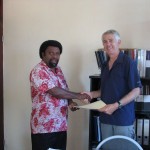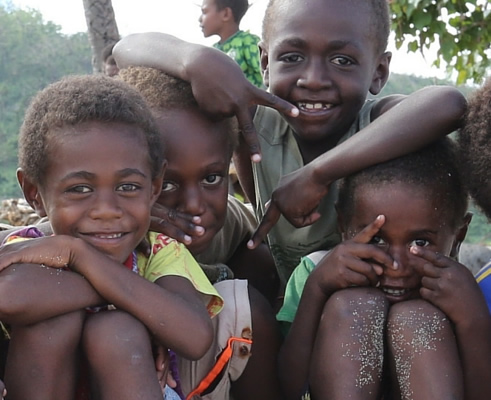
The Vanuatu Ministry of Education has also joined our MOU with the Ministry of Health.
In Port Vila, we spoke to Roy Obed, Director of Education Services from the Ministry of Education (“MOE”). Mr Obed highlighted the need for further training in the areas of English literacy, science, mathematics, librarianship and school management. He cited that a lack of adequately trained teachers continues to be a major problem with schools in the outer islands worst affected. The lack of sufficiently trained teaching staff extends down to pre-school level, a concern shared by Benson Tangou, Head Teacher at Sangalai School in the Maskelynes.
Increasingly, teachers are encountering poor literacy and numeracy skills in children attending their first year of primary school. This then impacts negatively on achievement standards in the ensuing years of school and either leads to high repetition rates or students dropping out of the formal education system altogether. This problem coupled with the cost of fees means that a substantial proportion of children in the Maskelynes and other outlying areas have a disjointed education. Responding positively to the poor survival rate of students at primary level and beyond, this year Mr Tangou established a Year 1 Nursery class to assist young children meet the minimum standards set by the national curriculum board before entering Year 1 primary.
For a number of years, a major focus of Vanuatu’s Ministry of Education has centred on achieving universal ‘fee free’ primary education and improving literacy rates. In 2010, with the help of Vanuatu’s development partners, compulsory parental school fee contributions were phased out in a direct response to declining primary school enrolment rates. Parents no longer pay the annual VT6 800 (approximately NZ$100) per child contribution towards fees for Years 1-6. Second only to the eradication of extreme poverty and hunger, ensuring every child receives free primary education remains a key Millenium Development Goal for the Vanuatu government. By 2015, it is hoped that boys and girls alike will be able to complete a full course of primary education.
It was as a result of these discussions with Roy Obed and other education officials that the MOE also decided to become a party to our MOU with the Ministry of Health.
Last year, the Butterfly Trust began its association with the Maskelynes Sangalai Centre School, a school serving approximately 250 students from Years 1-6 and the first 2 years of junior secondary school, Years 7 and 8. Currently the cost of fees for attending Years 7 and 8 are VT6 800 (NZ$100) per child and there are, as yet, no plans in place by the government to offer financial assistance to students wishing to receive further secondary schooling on mainland Malekula (Years 9-12). Last year, the cost of a year’s secondary schooling at one of the 3 main schools on the mainland was approximately NZ$600 per child. Costs have since risen to NZ$1 000 per child. With fluctuating copra prices, the harvesting of which is still a major source of income in rural Vanuatu, funding children’s school fees looks to remain a huge challenge for families every year.
With the guidance and oversight from representatives of both the MOE and MOH, the Butterfly Trust plans to maintain its financial assistance to Year 8 Sangalai School students in a bid to increase, gradually, the numbers of students attending and remaining at secondary school. We also hope to provide assistance with sourcing and facilitating teacher and literacy training workshops in the Maskelynes, building on existing programmes and improving access of teachers to such programmes on the mainland where these are available.
The overarching objective is quite simply to enable every boy and girl to receive an education. Secondly, to assist with improving the standards and quality of existing courses and programmes taught in line with the national curriculum.


